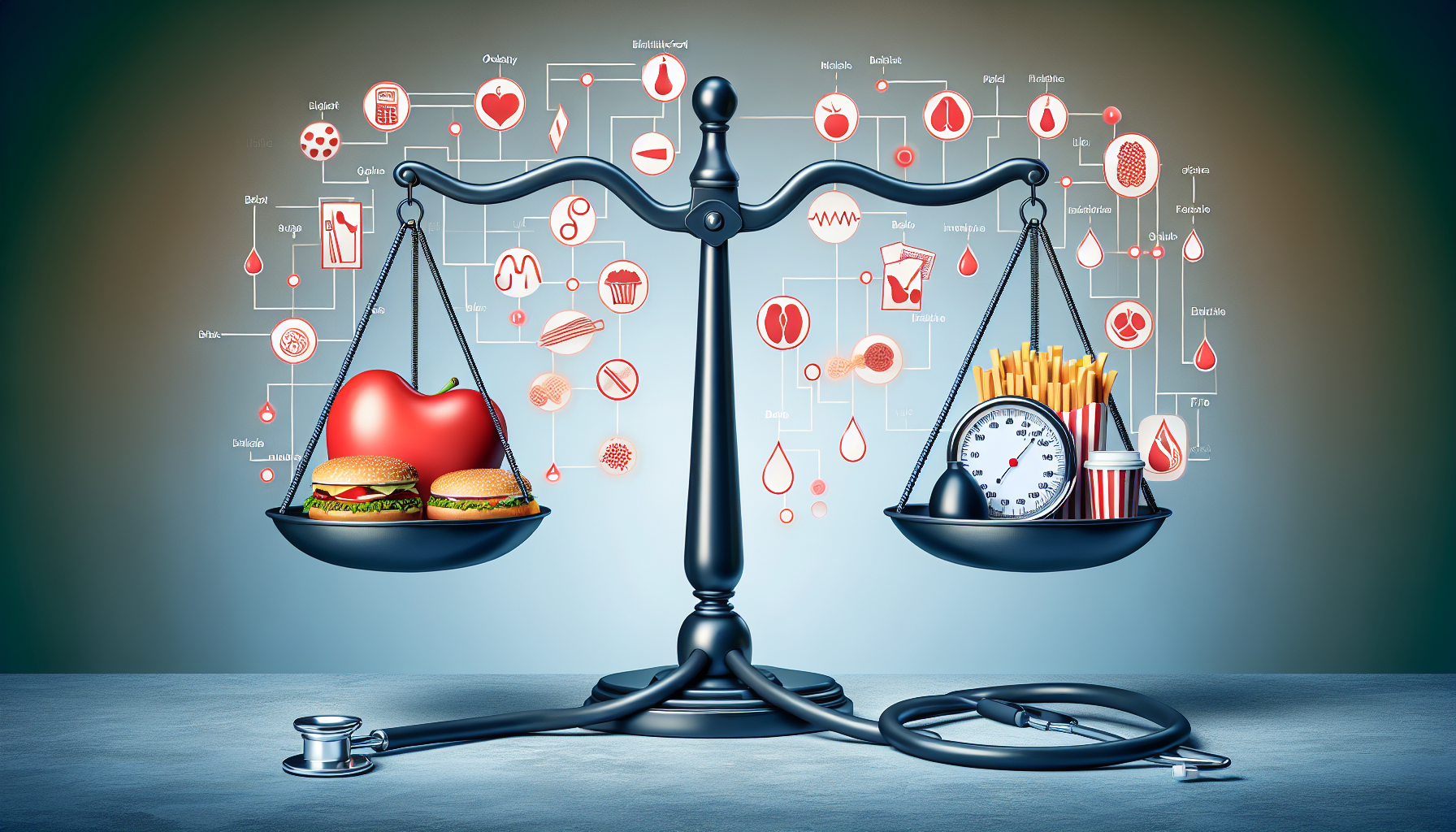Have you ever wondered if there is a connection between obesity and high blood pressure? Recent scientific studies have attempted to shed light on this intriguing question. For instance, a study published in the International Journal of Environmental Research and Public Health revealed that obesity is indeed associated with an increased risk of high blood pressure. Additionally, another study conducted by researchers from the University of Gothenburg found that individuals with obesity were more likely to develop high blood pressure over time. These studies, among others, provide valuable insights into the relationship between obesity and high blood pressure, emphasizing the need for further exploration in this area. So, let’s delve into the details and discover the fascinating link between these two health concerns.
Discover the Ultimate Weight Loss Secrets Here!
Definition of Obesity
Obesity refers to a condition in which a person has an excessive amount of body fat that may negatively affect their health. It is usually determined by calculating a person’s Body Mass Index (BMI), which is a measure of weight in relation to height.
Body Mass Index (BMI)
Body Mass Index (BMI) is a commonly used method to determine whether an individual is within a healthy weight range. It is calculated by dividing a person’s weight (in kilograms) by the square of their height (in meters). The resulting number is then compared to a BMI chart to determine the person’s weight status.
Obesity Categories
BMI is used to categorize individuals into different weight classes. These categories are as follows:
- Underweight: BMI below 18.5
- Normal weight: BMI between 18.5 and 24.9
- Overweight: BMI between 25 and 29.9
- Obesity (Class I): BMI between 30 and 34.9
- Obesity (Class II): BMI between 35 and 39.9
- Obesity (Class III): BMI of 40 or higher
Definition of High Blood Pressure
High blood pressure, also known as hypertension, is a medical condition characterized by elevated levels of blood pressure within the arteries. Blood pressure is a measure of the force exerted by the blood against the walls of the arteries as the heart pumps it.
Blood Pressure Levels
Blood pressure is recorded using two numbers: the systolic pressure (top number) and the diastolic pressure (bottom number). The systolic pressure represents the force when the heart contracts, while the diastolic pressure represents the force when the heart is at rest between beats. Normal blood pressure is typically considered to be around 120/80 mmHg.
Hypertension Categories
Hypertension is classified into different categories based on blood pressure readings. These categories are as follows:
- Normal: systolic pressure below 120 mmHg and diastolic pressure below 80 mmHg
- Elevated: systolic pressure between 120-129 mmHg and diastolic pressure below 80 mmHg
- Stage 1 hypertension: systolic pressure between 130-139 mmHg or diastolic pressure between 80-89 mmHg
- Stage 2 hypertension: systolic pressure of 140 mmHg or higher or diastolic pressure of 90 mmHg or higher
- Hypertensive crisis: systolic pressure higher than 180 mmHg and/or diastolic pressure higher than 120 mmHg
Click Here for Proven Fat-Burning Strategies!
Prevalence of Obesity and High Blood Pressure
Global Statistics
Obesity and high blood pressure are both significant global health concerns. According to the World Health Organization (WHO), around 1.9 billion adults worldwide were overweight in 2016, and of those, over 650 million were considered obese. Additionally, high blood pressure affects approximately 1.13 billion individuals worldwide.
Relationship between Obesity and High Blood Pressure Prevalence
Research suggests that there is a clear link between obesity and high blood pressure prevalence. Numerous studies have shown that as body weight increases, the risk of developing high blood pressure also increases. In fact, obesity is considered one of the major risk factors for the development of hypertension.
Potential Mechanisms
Several potential mechanisms have been proposed to explain the relationship between obesity and high blood pressure.
Hormonal Imbalance
Obesity can lead to hormonal imbalances, such as increased levels of insulin and aldosterone, and decreased levels of adiponectin. These imbalances can affect blood pressure regulation and contribute to the development of hypertension.
Insulin Resistance
Obesity is often associated with insulin resistance, a condition in which the body’s cells become less responsive to the action of insulin. Insulin resistance can result in higher levels of insulin in the blood, which can have a negative impact on blood vessel function and blood pressure regulation.
Inflammation
Obesity is characterized by a state of chronic low-grade inflammation. This inflammation can lead to endothelial dysfunction, a condition where the lining of blood vessels becomes impaired, leading to increased blood pressure.
Renal Factors
Excess body fat can affect the kidneys’ ability to regulate blood pressure. Increased levels of leptin, a hormone produced by fat cells, can contribute to renal dysfunction and ultimately lead to hypertension.
Study 1: “Impact of Obesity on Cardiovascular Health”
Summary of Study A comprehensive study focused on the correlation between obesity and cardiovascular health. It involved a large cohort and examined the incidence of heart diseases among obese individuals compared to those with a healthy weight.
Methods Used The study used longitudinal data analysis, tracking participants over several years, and included factors like BMI, lifestyle habits, and genetic predispositions.
Results Obtained The study found a significant increase in cardiovascular diseases among obese individuals, highlighting the importance of weight management in cardiovascular health.
Study 2: “Effects of Weight Loss on Blood Pressure in Obese Individuals”
Summary of Study This research explored how weight loss interventions affect blood pressure in obese patients. It included participants who underwent lifestyle changes including diet and exercise modifications.
Methods Used The study tracked changes in blood pressure, BMI, and overall health metrics over a period of 12 months, using both clinical assessments and self-reported data.
Results Obtained Participants showed a notable decrease in blood pressure levels following weight loss, suggesting that even moderate weight loss can significantly impact blood pressure control in obese individuals.
Study 3: “Obesity and Its Impact on Metabolic Syndrome”
Summary of Study A detailed study examined the relationship between obesity and the development of metabolic syndrome, a cluster of conditions that increase the risk of heart disease, stroke, and type 2 diabetes.
Methods Used Using a cross-sectional study design, researchers assessed obesity markers, blood sugar levels, cholesterol levels, and blood pressure in participants.
Results Obtained The study found a strong association between obesity and the prevalence of metabolic syndrome, emphasizing the need for targeted interventions to address obesity as a means to prevent metabolic syndrome.
Impact of Obesity on Blood Pressure
Direct Relationship
The link between obesity and high blood pressure is well-established, with multiple studies confirming a direct relationship between the two. As body weight increases, the risk of developing high blood pressure also increases. This occurs due to a variety of factors, including hormonal imbalances, insulin resistance, inflammation, and renal dysfunction.
Impact of Weight Loss on Blood Pressure
Weight loss has shown to have a positive impact on blood pressure levels. Shedding excess pounds can lead to improvements in blood pressure control, reducing the risk of hypertension. Adopting a healthy lifestyle, including a balanced diet and regular exercise, can aid in weight loss and subsequent blood pressure management.

Impact of High Blood Pressure on Obesity
Indirect Relationship
Research suggests that high blood pressure may indirectly contribute to the development of obesity. Individuals with high blood pressure have a higher risk of developing obesity over time. The underlying mechanisms of this relationship are still being studied, but hormonal and metabolic factors are thought to be involved.
Risk of Obesity Development
High blood pressure can disrupt normal metabolic processes, leading to hormonal imbalances and altered metabolism. These changes can promote weight gain and increase the risk of obesity development. Therefore, managing blood pressure levels is vital in preventing obesity and its associated health risks.
Management and Prevention
Adopting Healthy Lifestyle Habits
Adopting healthy lifestyle habits is essential for the management and prevention of both obesity and high blood pressure. These habits include consuming a balanced diet, minimizing processed and sugary foods, and incorporating more fruits, vegetables, whole grains, and lean proteins into your meals.
Weight Loss Strategies
For individuals who are overweight or obese, weight loss strategies are crucial. These strategies may involve setting realistic weight loss goals, monitoring calorie intake, and seeking support from healthcare professionals or weight loss programs.
Regular Exercise
Regular physical activity is essential for maintaining a healthy weight and promoting cardiovascular health. Engaging in moderate-intensity aerobic exercises, such as brisk walking, swimming, or cycling, for at least 150 minutes per week can have significant benefits for both obesity and high blood pressure management.
Dietary Modifications
Making dietary modifications can play a significant role in managing both obesity and high blood pressure. Limiting salt intake, reducing saturated and trans fats, and increasing fiber-rich foods can help control blood pressure and promote weight loss.
Stress Reduction
Chronic stress can contribute to the development of obesity and high blood pressure. Engaging in stress-reducing activities, such as meditation, yoga, or deep breathing exercises, can help mitigate the effects of stress on the body and promote overall well-being.
In conclusion, obesity and high blood pressure are closely related health conditions that can significantly impact an individual’s well-being. Understanding the relationship between the two, as well as implementing appropriate management and prevention strategies, is essential for maintaining optimal health. By adopting a healthy lifestyle, including regular exercise, dietary modifications, and stress reduction techniques, individuals can work towards preventing and managing obesity and high blood pressure effectively.



